#facefilters
Explore tagged Tumblr posts
Text
[Week 8]
📱 The Internet Sold Us a New Face - Now We Hate Our Own
"Fix Me" Filters & Fake Perfection: A Glitch in Reality?
Surgery filters have been widely criticized for promoting unrealistic beauty standards and harming mental health. One example is Instagram's "Fix Me" filter, banned due to its damaging psychological impact (BBC, 2019).
The filter mimicked a surgeon's markings on a patient's face, illustrating the process of cosmetic enhancement. Its creator, Daniel Mooney, intended it as a critique rather than a glorification of plastic surgery, highlighting its unglamorous reality (Mooney, 2019). However, Instagram's ban underscored a deeper issue - while filters can reinforce harmful beauty ideals, they are not the root cause. Instead, they reflect and amplify pre-existing societal pressures, making unattainable beauty the norm rather than the exception (Elias & Gill, 2017).
🚨 The real issue? Filters are not simply a tech innovation gone wrong but an extension of a billion-dollar beauty industry that profits from insecurity (Laham, 2020). While Mooney's filter was removed, the pressure to conform to digitally enhanced beauty remains stronger than ever, signaling that the issue runs more profound than any single app.
💭 So, are AR filters driving these toxic standards or merely exposing a system that has long dictated what is considered beautiful?
Eurocentric Beauty, Social Comparison & the Profitable Business of Insecurity

Leon Festinger's Social Comparison Theory (1954) explains how individuals evaluate self-worth by comparing themselves to societal norms (Festinger, 1954).
🔍 But beauty is not just an aesthetic preference; it is an industry that thrives on exclusion. The global Beauty & Personal Care, worth US$677.19bn, sustains itself by making people feel like they are never enough (Statista, 2024). In this economy, insecurity is currency, and filters are the salespeople, constantly redefining what is desirable.
✨ A striking example? Bella Hadid underwent rhinoplasty at just 14 (Ayoub, 2022), a decision shaped by the Eurocentric beauty ideals dominating her industry. Growing up in the spotlight, she was surrounded by a standard that favored features historically associated with whiteness - high cheekbones, small noses, and fair skin.
💭 Years later, she expressed regret, saying: "I wish I had kept the nose of my ancestors."
Her experience reveals how algorithmically curated beauty norms shape self-perception, pressuring individuals - especially those in the public eye - to conform from an early age.
Dr. Michelle Smith linked this to 19th-century ethnic rhinoplasty, when people altered their features to "pass as white" for social mobility (Ayoub, 2022). This historical parallel reveals how beauty has always been a tool of privilege and power.
Social media intensifies this struggle. Platforms like Instagram and Snapchat profit from comparison, filling feeds with filtered, surgically enhanced faces that subtly suggest: This is what you should look like (Lavrence & Cambre, 2020).
💥 The result? This cycle fuels body dysmorphia, particularly among women and marginalized communities. However, resistance is growing - movements like body positivity, digital detoxing, and online activism challenge the dominant beauty narrative (Coy-Dibley, 2016).
Yet, the damage is already done. The rise of "Snapchat Dysmorphia" proves that filters do not just change appearances; they change how we see ourselves.
Snapchat Stole My Face: When Filters Rewrite Self-Perception
🎥 Four video testimonies reveal a disturbing trend: Women, confronted with their unfiltered reflections, express profound depression and self-disappointment (Hawker & Carah, 2020). This is not a fleeting moment of dissatisfaction - it is a psychological fracture, where the self they see in the mirror no longer matches the self they have been conditioned to expect.
For some, the solution is drastic: deleting Snapchat altogether, a digital amputation in pursuit of mental stability. For others, the cycle of insecurity continues - trapped in a loop where natural skin textures and facial features feel like defects rather than differences (Hawker & Carah, 2020).
🤳 This phenomenon directly aligns with Festinger's Social Comparison Theory - filters do not just offer enhancements; they create a new, unattainable benchmark for beauty, forcing users into constant comparison (Festinger, 1954). When social media rewards digital perfection, reality starts feeling like a flaw.
💔 Ultimately, these experiences reinforce the central theme of this essay: The internet did not just sell us a new face - it made us hate our real one. Through AR filters, beauty standards have shifted from aspirational to artificial, leaving a generation struggling to accept their reflections (Burnell et al., 2021).
What do you think? Are filters the real villain, or are they just exposing a much bigger issue? 💬 Drop your thoughts below! ⬇️
References
Ayoub, S. (2022, March 18). On Bella Hadid, beauty standards and the shame of hiding your ethnicity. The Sydney Morning Herald. https://www.smh.com.au/lifestyle/beauty/on-bella-hadid-beauty-standards-and-the-shame-of-hiding-your-ethnicity-20220318-p5a5rd.html
BBC. (2019, October 23). Instagram bans “cosmetic surgery” filters. BBC News. https://www.bbc.com/news/business-50152053
Burnell, K., Kurup, A. R., & Underwood, M. K. (2021). Snapchat lenses and body image concerns. New Media & Society, 24(9), 146144482199303. https://doi.org/10.1177/1461444821993038
Coy-Dibley, I. (2016). “Digitized Dysmorphia” of the female body: the re/disfigurement of the image. Palgrave Communications, 2(1), 1–9. https://doi.org/10.1057/palcomms.2016.40
danielmooney . (2019). Instagram. Instagram.com. https://www.instagram.com/danielmooney/p/Bx2XdrSIc2R/?img_index=1
Elias, A. S., & Gill, R. (2017). Beauty surveillance: The digital self-monitoring cultures of neoliberalism. European Journal of Cultural Studies, 21(1), 59–77.
Festinger, L. (1954). A Theory of Social Comparison Processes. Human Relations, 7(2), 117–140. https://doi.org/10.1177/001872675400700202
Hawker, K., & Carah, N. (2020). Snapchat’s augmented reality brand culture: sponsored filters and lenses as digital piecework. Continuum, 35(1), 1–18. https://doi.org/10.1080/10304312.2020.1827370
Laham, M. (2020). Made Up. Google Books. https://books.google.com.vn/books?hl=en&lr=&id=sgPzDwAAQBAJ&oi=fnd&pg=PR9&dq=billion-dollar+beauty+industry+that+profits+from+insecurity&ots=AZ_Qn9qi2Y&sig=fo1J-veHSTuCngYQ0c2NacQ5-iE&redir_esc=y#v=onepage&q&f=false
Lavrence, C., & Cambre, C. (2020). “Do I Look Like My Selfie?”: Filters and the Digital-Forensic Gaze. Social Media + Society, 6(4), 205630512095518. https://doi.org/10.1177/2056305120955182
Statista. (2024). Beauty & Personal Care - Worldwide | Statista Market Forecast. Statista. https://www.statista.com/outlook/cmo/beauty-personal-care/worldwide
#mda20009#BeautyStandards#SocialMediaEffects#DigitalPerfection#SelfLove#BodyImage#MentalHealthMatters#ARFilters#SnapchatDysmorphia#EurocentricBeauty#BeautyIndustry#UnrealisticStandards#FaceFilters#WhoDefinesBeauty#GlitchInReality#TheCostOfPerfection#FilteredReality#ComparisonCulture#DigitalInsecurity
0 notes
Note
i know obviously abel has a nose, but he really reminds me of that ‘wait they dont love you like i love you’ tiktok trend with the face filter i’m sorry 😭
THE. THE WHt treND⁉️⁉️⁉️
ok looked it up, I JUST SEE PPL DANCING? WHAT FACEFILTER😭😭😭 BUT— ARE YOU IMPLYING MY GUYS NOSE IS TOO HARD TO SEE😭😭⁉️
2 notes
·
View notes
Text
0 notes
Text
How to get the Justin Bieber Facefilter on TikTok?
How to get the Justin Bieber Facefilter on TikTok? @nicholashuy Best filter so far 🤣🤣 #fyp #foryou ♬ Love Me – Justin Bieber TikTok Challenges are an excellent opportunity to get new followers. By joining a trend, you can benefit from the general interest. I have introduced you to a few of the past TikTok challenges and given you tips on how to participate. Now it’s time for the Justin Bieber…
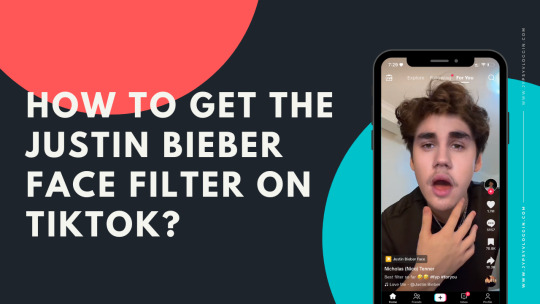
View On WordPress
0 notes
Text
Week 7: Face Filters
In this week's post, I am going to divulge the reality of face filters within the social media landscape, and how filtering is associated with a digital embodiment, beauty standards and pressures ingrained in societies culture. For this week, we exemplified the effect that face filters have on ethical digital citizenship, an individual's self-worth, body image, and in some cases, how it can result in 'Digitised Dysmorphia'. In one of the readings, Coy-Dibley (2016, p. 5) addresses the reality in which digitised cultures are similar to online beauty fixation, which in most cases, woefully results in 'Digitised Dysmorphia' and surgery.
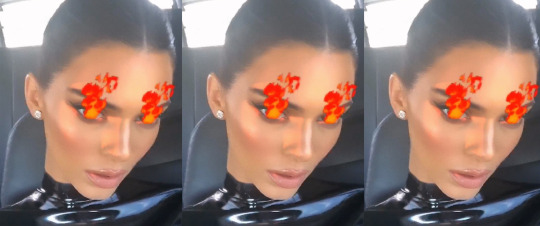

What is Face Filtering?
AR “face filters” — a mask-like augmented reality that adds virtual objects to an individual's face—have become wildly popular on Instagram, Snapchat, and even video calling on FaceTime. ... Often seen as play, AR face filters can provide an engaging and personal art experience. ("Face Filters for Instagram and Snapchat Are the New Frontier of Surrealist Art", 2019)
How do face filters work?
They detect an image of a face and superimpose virtual elements onto that face via AR. As the subject turns their head or makes different facial expressions, they activate the AR experience.
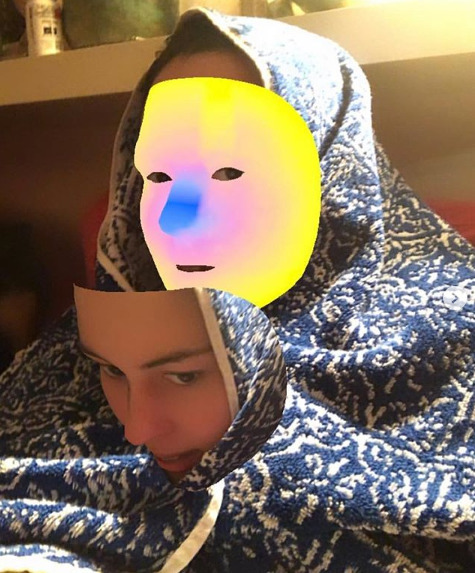
“Mask Off” by Jon Han. The filter pictured removes a user’s face, revealing a new identity underneath
Popular face filtering apps:
1. Facetune
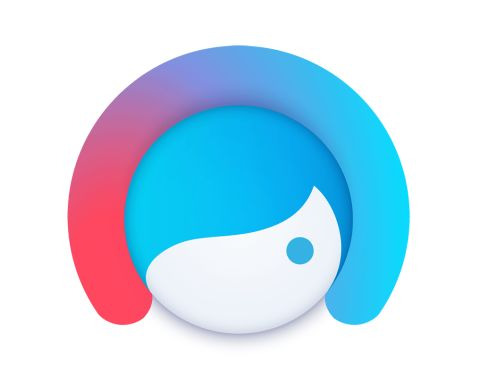

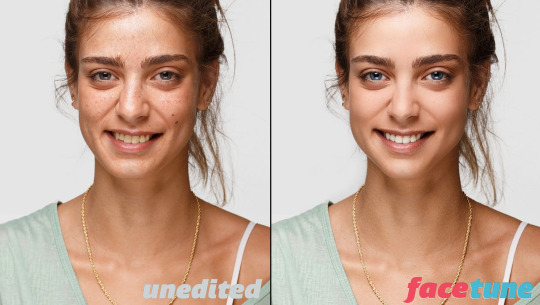
Facetune is a photo editing application used to edit, enhance, and retouch photos on a user’s iOS or Android device created by Lightricks. The app is often used for portrait and selfie editing.
“The massively popular photo-editing app Facetune is driving a generation of young women to extreme and obsessive lengths to look flawless online.” ("Selfies, Surgeries And Self-Loathing: Inside The Facetune Epidemic", 2021)
Before and After example from Facetune:
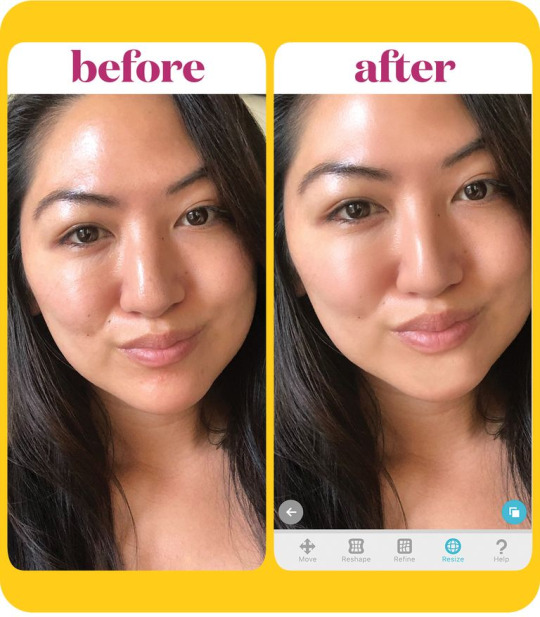
^ As you can see in the above image that on the left is a woman’s face with no filter and no makeup and on the right, her face in FaceTune with bigger lips, a smaller, straighter nose, and zero blemishes in sight.
From using the “Reshape” tool to cinch in your waist and give yourself a breast lift or even make your butt rounder, Facetune has many options to chose from to alter your appearance. It is addicting and can become an obsession for many. Some people even purchase the paid version of the app to have access to “more technical tweaks”, like individually repositioning your eyebrows and narrowing the tip of your nose.
According to Facetune user, Sky Lane, “It can get super obsessive because the second I take a photo I feel like I need to Facetune it,” “Now I’ll be like, ‘Oh my God, I’m chubby, but I can fix that.’” ("Selfies, Surgeries And Self-Loathing: Inside The Facetune Epidemic", 2021). Facetune makes it harder for people to love themselves, but at least they can love their edited photo, right?
Sky Lane’s Facetune image that she uploaded to Instagram:
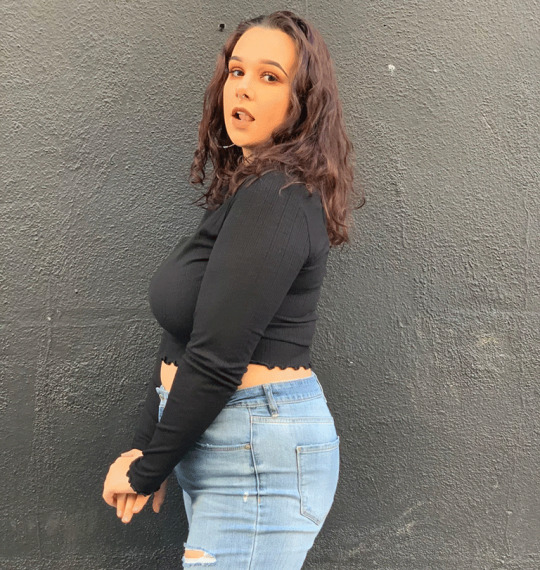
2. Photoshop Fix
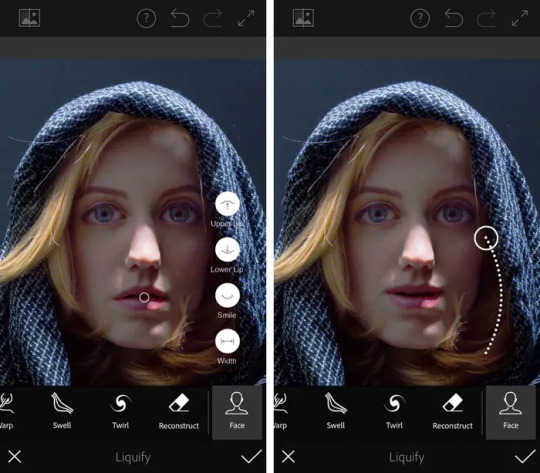
Photoshop Fix is not as easy to use as some of the other apps but it’s well worth learning. It includes a large range of photo retouching tools. The Lighten tool is great for teeth whitening and you can use the Smooth tool to even out skin. (Hermans, 2021)
The Healing brush will correct spots and blemishes quickly without effort. The standout feature is the Liquify tool, which allows you to make adjustments to facial features. (Hermans, 2021)
Why do people use filters?
Filters could prime us for biometric observation. (Rettberg 2017)
They have the potential to change self-perception on a mass scale.
They also offer us the ability to positively explore identity through digital dis/embodiment.

How Does Social Media Affect Beauty Standards and Mental Health?
Face filtering has been around for decades now, however with spending more time than ever on social media due to the COVID-19 pandemic, the face-tuning epidemic has only accelerated... There are only consequences to using face filters.
The pervasiveness of these filtered and manipulated images can seriously affect a person's self-esteem. Using these beautification filters can have severe consequences; they not only make you feel bad that you are not in the real world, but can also lead to digitised dysmorphia. They affect both self-image and self-esteem.
Believe it or not, the filters that are causing the most harm are those which alter facial features such as having larger eyes, blurred skin or bigger lips. It may not sound extreme, but perversely, it can lead us to believe a false sense of reality.
https://big.assets.huffingtonpost.com/athena/files/2021/05/18/60a40b5ee4b014bd0cb1ddc0.mp4
What is Digitised Dysmorphia?
Digitised Dysmorphia (Coy-Dibley 2016) is theory that helps us understanding the pressure placed on women to alter the digital image.
Digitised Dysmorphia is on a spectrum with BDD, but differs for two reasons:
- It is not a medical condition but a “socially constructed condition that is enabled by digital technology.”
- It is not inherently negative, and there is potential for positive uses of beauty technology.
Face Filtering and their link to Digitised Dysmorphia:
Woefully, for those obsessed and addicted individuals who use face filtering for every one of their images, their digital selves are the only version people see of them. And unfortunately for many, they can’t distinguish between their virtual persona with their reality which is a result of body dysmorphia. Dysmorphia at the extremes defies basic human psychology with an increase in unattainable beauty standards.

From FaceTune to Surgeries:
According to Huffpost, a teenager got her first Botox and lip fillers as a junior in college. That same year, she brought a Facetuned photo of her nose to her surgeon to turn it into a reality.
Facetune isn’t just a planning tool for people who are already considering cosmetic surgery. A study published last year by Dr. Michael Reilly revealed that “using Facetune actually instills and increases people’s desire to go under the knife”. ("Digital Appearance Manipulation Increases Consideration of Cosmetic Surgery: A Prospective Cohort Study", 2021)
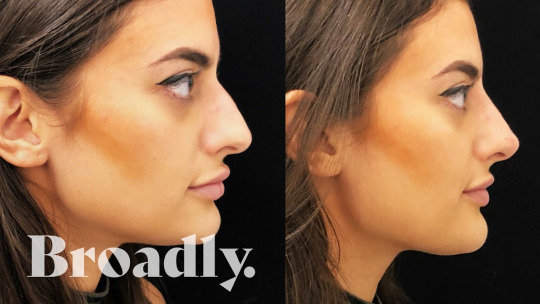
YouTube video link about a teenager girl getting a nose job based on a facetuned photo of her nose: https://www.google.com/url?sa=i&url=https%3A%2F%2Fwww.youtube.com%2Fwatch%3Fv%3D5ZOpLpSNW6c&psig=AOvVaw17OSXBQYTL53-RQMD1BNSR&ust=1621946791186000&source=images&cd=vfe&ved=0CA0QjhxqFwoTCJDl9-ms4vACFQAAAAAdAAAAABAJ
Are there any positives to using Face Filters?
Despite the dangers of face filtering, I personally believe that there are benefits concerning creativity. And I'm not the only one who agrees... According to an article, "Face Filters for Instagram and Snapchat Are the New Frontier of Surrealist Art". Jessica Herrington says, "By making AR filters, artists are creating tools. Instead of creating a singular experience, an individual with access to AR face filters is able to express, collaborate, and share multiple versions of themselves at any time. This way of producing and sharing multiple selves on such a massive scale is completely new in the history of art creation." ("Face Filters for Instagram and Snapchat Are the New Frontier of Surrealist Art", 2021).
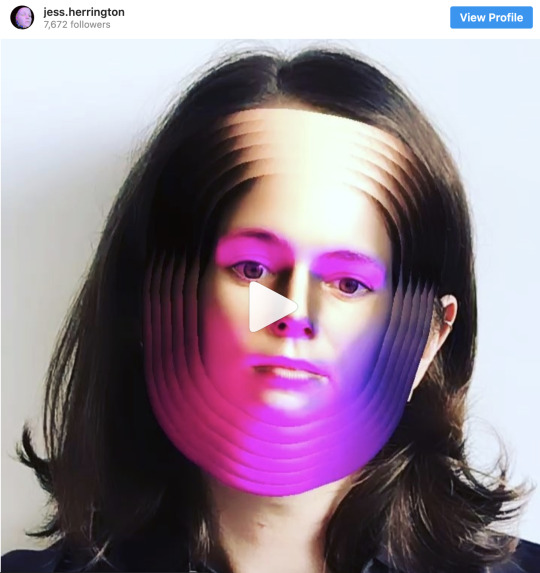
Examples of Face Filtering used as AR Art:
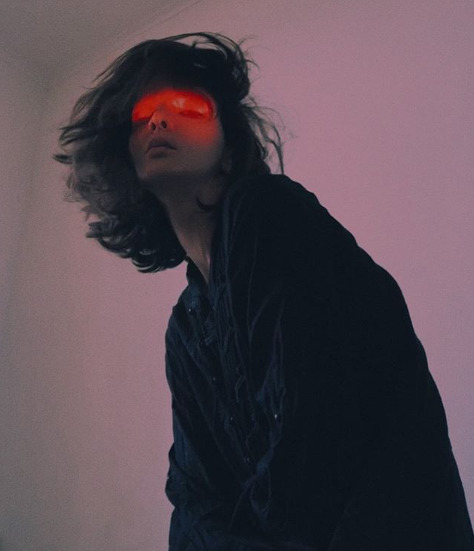
“Badland” by Johanna Jaskowska. The filter places red lighting over the user’s eyes acting as a mask.

“Love Machine” by Marc Wakefield. The user’s face is opened to reveal a robotic skull underneath.
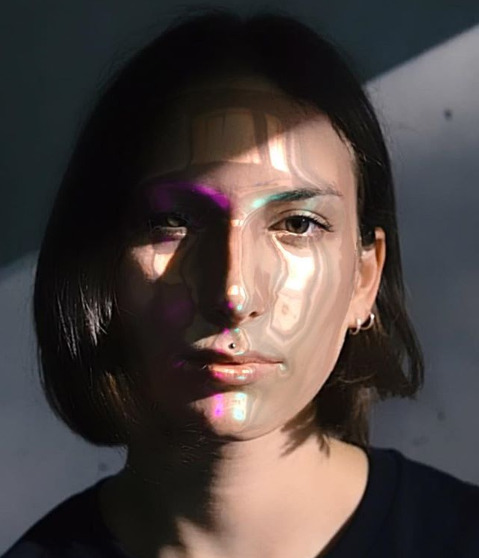
“Beauty 3000” by Johanna Jaskowska. The filter pictured applies a shiny, luminescent skin to a user’s face.
References:
Selfies, Surgeries And Self-Loathing: Inside The Facetune Epidemic. (2021). Retrieved 24 May 2021, from https://www.huffpost.com/entry/facetune-selfies-surgeries-body-dysmorphia_n_60926a11e4b0b9042d989d48
Coy-Dibley, I. 2016 “Digitized Dysmorphia” of the female body: the re/disfigurement of the image, Palgrave Communications, vol. 2, 16040, Retrieved 24 May 2021, <https://doi.org/10.1057/palcomms.2016.40>.
Face Filters for Instagram and Snapchat Are the New Frontier of Surrealist Art. (2019). Retrieved 24 May 2021, from https://onezero.medium.com/the-power-of-face-filters-as-augmented-reality-art-for-the-masses-65a95fb4a577#:~:text=AR%20%E2%80%9Cface%20filters%E2%80%9D%20%E2%80%94%20a,even%20video%20calling%20on%20FaceTime.&text=Often%20seen%20as%20play%2C%20AR,engaging%20and%20personal%20art%20experience.
Hermans, J. (2021). 7 Best Photo Retouching Apps for Smartphone Portraits 2021. Retrieved 24 May 2021, from https://expertphotography.com/photo-retouching-apps/
Digital Appearance Manipulation Increases Consideration of Cosmetic Surgery: A Prospective Cohort Study. (2021). Retrieved 24 May 2021, from https://pubmed.ncbi.nlm.nih.gov/32503384/
(2021). Retrieved 24 May 2021, from https://pubmed.ncbi.nlm.nih.gov/26469879/
#facefilters#filtering#beauty#instagram#socialmedia#dysmorphia#bodydsymorphia#digitiseddysmorphia#plasticsurgery#nosejob
4 notes
·
View notes
Photo

Do you agree? How often do you use filters? Which app has the best filters? . . . . . #aestheticfilters #filtersfordays #instafilters #facefilters #instadaily #followme #beautiful #saturate #selflove #igfilters #filterselfie #nisifilters #comment #snapfilters #filter #vscofilters #polarrfilters #filters #instagramfilters #mood #love #follow #picoftheday via @hashtagexpert https://www.instagram.com/p/CNdoZwEFY-N/?igshid=1hjgt82pg12xt
#aestheticfilters#filtersfordays#instafilters#facefilters#instadaily#followme#beautiful#saturate#selflove#igfilters#filterselfie#nisifilters#comment#snapfilters#filter#vscofilters#polarrfilters#filters#instagramfilters#mood#love#follow#picoftheday
1 note
·
View note
Photo

Infinity Icon 🐣 try it on 👀🙃➡️ https://www.instagram.com/a/r/?effect_id=445871183005070
#sparkar#facefilters#cyber#cybertokyo#tokyo#cyberpunk#cyberparty#GraphicDesign#cindy kutikova#face filter
38 notes
·
View notes
Video
instagram
#tfw you’ve been staring at yourself with a Snapchat filter for too long and your own face starts to look weird to you 👽🙀👀#Snapcat #aliencat #whatswrongwithyourcat #thataintright . . . #facefilters #facefiltersoncats #oliveandryevids #catvideo #cute #cats #snapcat #funnycat #funnycatvideo #buzzfeedanimals #cute #oliveryefig #thedodo #weeklyfluff #catsofinstagram #tricorncats #9gag #meowed https://www.instagram.com/p/Bxx9pPhhq8G/?igshid=1vnth275mno98
#tfw#snapcat#aliencat#whatswrongwithyourcat#thataintright#facefilters#facefiltersoncats#oliveandryevids#catvideo#cute#cats#funnycat#funnycatvideo#buzzfeedanimals#oliveryefig#thedodo#weeklyfluff#catsofinstagram#tricorncats#9gag#meowed
1 note
·
View note
Video
instagram
Inspired by The Beatles’ wise lyrics for The End. . . “Oh yeah, all right Are you going to be in my dreams Tonight? And in the end The #love you take Is equal to the #love you make” . . #amour #amor #vida #pareja #family #familia #lifeteam #gif #facefilters #creativity | model/performer: hubby @michaelrstreet #💜 (at Northeast Dallas-white Rock, Dallas, Texas) https://www.instagram.com/p/BxmB4GnH_2L/?igshid=6izy2wkevy4v
1 note
·
View note
Photo

Filter by @aanasha #flowers #igfilter #filter #mask #instagramstories #instagramfilter #facefilters #arfilter #jypsyfilters #jypsyfix #instafilters #instagramfilters #ig_filter #beautyfilters #igmask #chanel www.jypsyvloggin.com https://www.instagram.com/p/B56DVdIHcsp/?igshid=xy3ogzkl3rqk
#flowers#igfilter#filter#mask#instagramstories#instagramfilter#facefilters#arfilter#jypsyfilters#jypsyfix#instafilters#instagramfilters#ig_filter#beautyfilters#igmask#chanel
1 note
·
View note
Photo

Identidade Uma das consciências que se manifesta para se identificar consigo mesmo ou com o coletivo. Quantas identidades se coleciona em uma só vida? - Filter @johwska + @jacque.jordao . . . #johwska #facefilter #filter #mask #facefilters (em São Paulo, Brazil) https://www.instagram.com/p/Bt5-1qaAW_2/?utm_source=ig_tumblr_share&igshid=dai8v59bke27
2 notes
·
View notes
Video
Custom face filters will create more customer engagement with your brand! Want one for your brand !! Kindly ping us ! #facefilters #arstudio #sparkar #customerexperience #customerconnect #customerengagement #branding #advertising #techadvertising #augumtedreality #virtualreality (at Chennai, India) https://www.instagram.com/p/BqvzAQilCpg/?utm_source=ig_tumblr_share&igshid=qe2pf9h3226w
#facefilters#arstudio#sparkar#customerexperience#customerconnect#customerengagement#branding#advertising#techadvertising#augumtedreality#virtualreality
1 note
·
View note
Photo

Heya 🤗😊❤️💮. . . . . . . . . . #featured #featureme #explore #exploreme #facefilter #facefilters #facefilterart #facefilterforinstagram #facefilterbeauty #facefilterfun #facefiltermashup (at Uttarakhand - The Heaven On Earth) https://www.instagram.com/p/CSeTN_gF7XO/?utm_medium=tumblr
#featured#featureme#explore#exploreme#facefilter#facefilters#facefilterart#facefilterforinstagram#facefilterbeauty#facefilterfun#facefiltermashup
0 notes
Photo
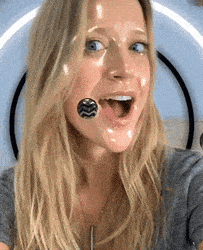
(via GIPHY)
#giphy#facebook#brands#augmentedreality#sparkar#twolane#antigravity#twolanesocial#funnyfacefilters#facefilters#practiceloopeffect
0 notes
Video
Inspired by The Beatles’ wise lyrics for The End. . . “Oh yeah, all right Are you going to be in my dreams Tonight? And in the end The #love you take Is equal to the #love you make” . . #amour #amor #vida #pareja #family #familia #lifeteam #gif #facefilters #creativity | model/performer: hubby @michaelrstreet #💜 (at Northeast Dallas-white Rock, Dallas, Texas) https://www.instagram.com/p/BxmA2G6nUDh/?igshid=xkczlt6dji6c
1 note
·
View note
Text
Digital Citizenship and Software Literacy: Instagram Filters
‘Digital Dysmorphia’, a term coined by Isabelle Coy-Dibley (2016) is defined as the altering of supposedly undesirable parts of the self through modification and supposed fixing of the visual or virtual appearance of an individual’s self through various apps. In her article, Coy-Dibley states that this term is shared with Body Dysmorphic Disorder (BDD) whereby, individuals are concerned with some aspect of their appearance that they consider ugly, unattractive or “not right” in some way. It is not difficult to see how the disorder has had on an impact on the digital space. In the advent of the COVID-19 pandemic in the United States in 2020 and as social distance became practiced, ‘Facetune’, had generated an increase of 20% in the use of its app by users. The editing app turns your face and body into digital Play-Doh, to mold, pinch, and add volume wherever you want (Rodulfo, 2020). It is simple to conclude that this disorder is rampant globally and is an issue that will debated as social media use grows with every single year.
However, Coy-Dibley (2016) points out that this disorder not only affects women but also men. She quotes that “there has been a growing preoccupation with weight and body image in men, which parallels this increased ‘visibility’ of the male body.” Although not as evident as that of women, this can be seen in the engagement of physical activity by males in Australia. According to the Australian Institute of Health and Welfare (2019), they state that in the 2017–18 survey period, 50% of men aged 18 and over were sufficiently physically active and 1 in 4 men (25%) did strength or toning activities on 2 or more days. Moreover, 30% of Australians have a gym membership (Physical Activity Australia, 2019). Therefore, it has been demonstrated that although men do not often exhibit images that manipulate their image on social media. Although they do take efforts to improve their image such as going to the gym which I myself am currently attending often.
References
Australian Institute of Health and Welfare 2019, The health of Australia’s males, Australian Government, viewed 22 April 2021, < https://www.aihw.gov.au/reports/men-women/male-health/contents/lifestyle-and-risk-factors/physical-activity>.
Coy-Dibley, I 2016, “Digitised Dysmorphia” of the Female Body: The Re/Disfigurement of the Image, Palgrave Communications.
Physical Activity 2019, Gyms and Fitness Centres in Australia – Market Research Report, Physical Activity Australia, viewed 22 April 2021, < https://www.physicalactivityaustralia.org.au/gyms-and-fitness-centres-in-australia-market-research-report/#:~:text=Around%2030%20per%20cent%20of,activities%20in%20full%2Dservice%20gyms.>.
Rodulfo, K 2020, How Face Filters on Instagram, Facetune Affect Mental Health, Women’s Health, viewed 22 April 2021, < https://www.womenshealthmag.com/beauty/a33264141/face-filters-mental-health-effect/>.
0 notes